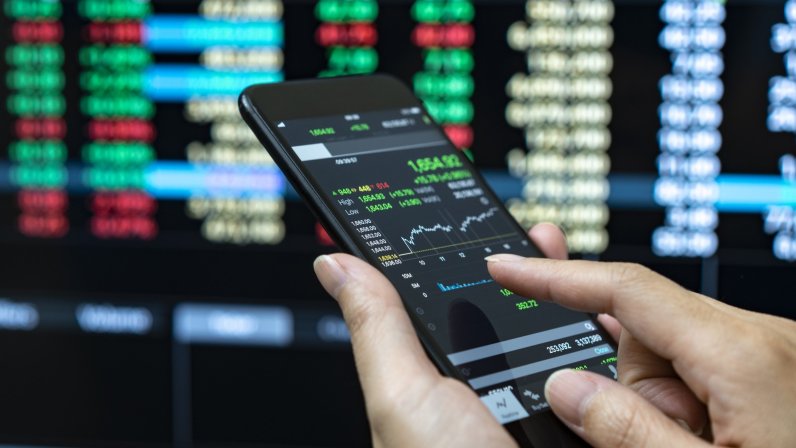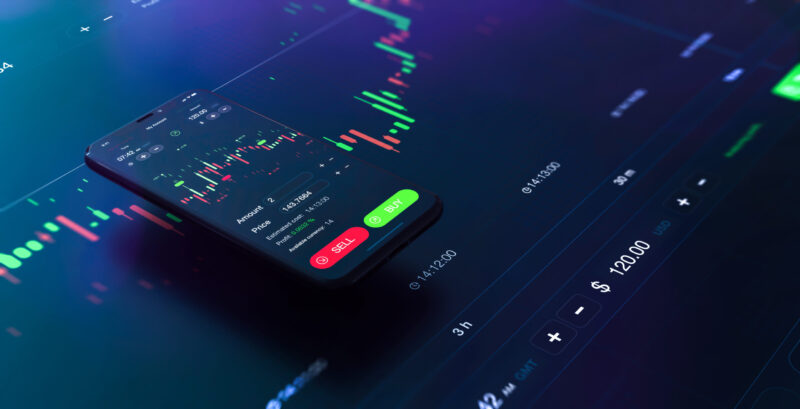Online trading has democratized access to the world’s financial markets. It involves the buying and selling of securities over an internet-based trading platform. This gives traders the opportunity to profit from the comfort of their homes, potentially opening doors to financial independence. However, it’s not as simple as it might initially appear. The key to success lies in setting realistic expectations and a disciplined approach.
Financial independence is the state of having sufficient income to cover your living expenses for the rest of your life without being employed or dependent on others. Online trading, which allows the generation of profits from market movements, is one potential vehicle to achieve this state. However, financial markets are inherently unpredictable, meaning it’s crucial to approach online trading with a level-headed understanding of its potential and limitations.
Understanding the Basics of Online Trading

Online trading can involve a multitude of assets, including stocks, forex, commodities, and even cryptocurrencies. Each type comes with its own intricacies, requiring different strategies and risk management approaches.
To navigate these markets, understanding basic concepts such as market orders, limit orders, and stop-loss orders is paramount. A market order is an instruction to buy or sell at the best available price immediately. A limit order sets a specific price for buying or selling, offering more control but not guaranteeing execution. A stop-loss order aims to limit an investor’s loss by selling a security when it reaches a certain price. These tools are integral for managing positions and risks in online trading.
Factors to Consider Before Getting Started
Before starting your online trading journey, it’s vital to conduct thorough research and understand the risks involved. This can involve understanding the asset’s historical price movements, its response to market events, and its overall volatility.
Moreover, it’s critical to establish a solid financial foundation before stepping into online trading. It’s not wise to risk funds you can’t afford to lose. Experts recommend only using discretionary funds – money that isn’t essential for daily living or long-term financial plans – for trading.
Developing a Trading Strategy
Trading without a plan is like navigating uncharted waters without a compass. A trading strategy should outline your specific financial goals, risk tolerance, and methodologies. It should clearly define what you want to achieve, how much you’re willing to risk, and under what conditions you’ll enter and exit trades.
Realistic profit targets and acceptable losses are key elements of this plan. Set achievable objectives and decide upfront how much loss you can bear. This strategy will guide your trading decisions and help you stay disciplined during turbulent market conditions.
Managing Risk in Online Trading

Risk management is a crucial aspect of online trading, especially considering the inherent volatility of financial markets. Techniques like diversification, position sizing, and the risk-reward ratio can help protect your capital and enhance the probability of long-term success.
Diversification involves spreading investments across various assets, such as stocks, bonds, and commodities, to reduce exposure to any single one. By doing so, you minimize the impact of adverse events that may affect a specific sector or market.
Position sizing, on the other hand, means limiting the amount invested in each trade. This approach prevents one bad trade from wiping out your entire trading account, ensuring that you have enough capital to participate in future opportunities.
Additionally, the risk-reward ratio is a valuable tool for assessing the potential profitability of a trade. It compares the potential profit to the potential loss, allowing traders to evaluate whether the potential return justifies the level of risk involved.
When engaging in online trading, it is essential to partner with a reliable forex broker, which The Liquidity can confirm. A reputable broker provides access to various financial instruments, reliable trading platforms, and necessary resources for informed decision-making. Furthermore, understanding the concept of liquidity, which refers to the ease of buying or selling an asset without causing significant price fluctuations, is vital when choosing a forex broker. Opting for a broker with strong liquidity ensures that your trades can be executed efficiently and at fair market prices.
Emotional Discipline in Online Trading
Online trading can be a psychological roller-coaster. The key to survival is maintaining emotional discipline. It involves staying objective and avoiding impulsive decisions driven by fear or greed.
Remember, emotions can be the biggest enemy of a trader. Fear might lead you to sell at a loss, while greed might cause you to hold onto a losing position in the hope it will rebound. A balanced mindset, emotional control, and adherence to your trading plan can go a long way in ensuring sustained success.
Learning from Mistakes and Continuous Improvement
Trading involves making predictions in a realm of uncertainty, and mistakes are inevitable. What separates successful traders from unsuccessful ones is the ability to learn from these mistakes, adapt their strategies, and continually improve their skills.
Managing Expectations: Realistic Returns and Timeframes

Setting realistic expectations is paramount in trading. While stories of overnight millionaires might be appealing, they’re exceptions rather than the norm. Understanding that profitability in trading is a function of time, patience, skill, and market conditions can help manage expectations and keep frustration at bay.
Avoiding Scams and Questionable Practices
Online trading, like any industry, is not immune to scams. It’s crucial to recognize and avoid dubious schemes that promise guaranteed profits or “get-rich-quick” opportunities. Always verify the credibility of trading platforms and never invest based on promises that sound too good to be true.
Utilizing Online Trading Tools and Resources
Successful trading involves making informed decisions. Thankfully, numerous tools and resources can assist with this. Trading platforms provide live market data, analytical tools offer in-depth insights, and educational materials can help enhance your market understanding.
Seeking Professional Advice and Mentorship

While self-learning is a vital part of trading, seeking advice from financial advisors or experienced traders can provide valuable insights. They can help you navigate the complexities of financial markets, avoiding common pitfalls, and maximizing opportunities.
The Journey to Financial Independence
The road to financial independence via online trading isn’t easy. It demands dedication, discipline, continuous learning, and above all, realistic expectations. It’s important to understand that online trading is not a lottery but a strategic game that requires knowledge, planning, and risk management. The journey might be long and challenging, but with the right mindset and tools, it can certainly be rewarding.

